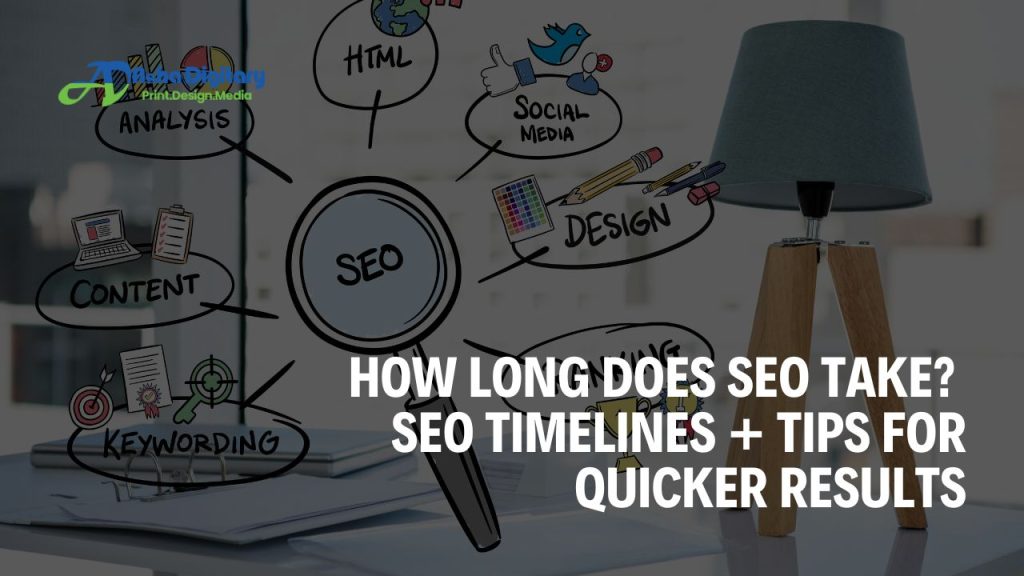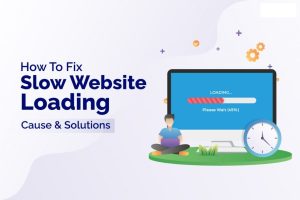In the ever-evolving digital landscape, one question seems to echo through the minds of businesses and marketers alike: An often-heard question in the world of SEO is, ‘How long does SEO take?’ There is nothing unique about the desire for higher rankings on search engine results, more organic visitors, or greater visibility; however, the timeline for getting those is unclear. Is SEO something that can be done overnight or is it a long-term investment? It is time to delve into SEO timelines deeper, to learn what impedes the progress, and to disclose tricks that help to reach better results much faster and remain reasonable.
Understanding the Journey of SEO
SEO or Search Engine Optimization refers to the process of making your site as user-friendly as possible to search engines like Google among others. In contrast to other marketing techniques, SEO’s concept is far from obtaining instant results. On this it resembles a garden that you sow and do not reap on the very same day; if you are patient, you will reap big.
SEO comprises several factors such as keyword research, on-page optimization, production of content, and link building, all of which help in determining the level of your website’s approval and ranking. The rewards are compounded; the greater the input you invest the greater the payoff after some time of waiting. However, the time it takes to notice the effectiveness depends on many factors as earlier discussed.
How Long Does SEO Take?
The period required to obtain the SEO results is one of the most discussed subjects. Some experts believe that it may take 3 to 6 months to get initial outcomes, some others go even further stating that it may take 12 months and even more, to get visibility and traffic. But why the disparity?
Why SEO is Not an Overnight Process
SEO is not something that can be done within a short period, it is a long process, a race that is run over several years. To this end, while paid advertising is instant in the sense that people get to see it the moment it has been placed, SEO needs search engines to trust it. These factors are namely: frequency of updating the content, its relevance, authoritative backlinks, and proper website structure. Organic Listings Also It takes some time before search engines such as Google crawl index then evaluate the relevance of the posting before giving it ranks. Thus, any claims of ‘getting your site to rank in an instant’ should be looked at with a pinch of salt.
The 3-6 Month Benchmark for SEO
This means that a common time horizon, in most cases, to evaluate the first results of an SEO campaign can be set as 3-6 months. You may find there several keyword positions boosted, slight organic traffic growth, and increased site exposure during this period. But these early results are usually only the starting point. Actual growth is often seen, depending on the firm’s SEO plan, at least after 6 to 12 months of operation.
Factors Influencing SEO Timelines
Several factors probably determine the speed at which an organization or an independent can notice the impact of SEO. Let’s dive into some of the most critical ones: Let’s dive into some of the most critical ones:
The Role of Website Age in SEO Timelines
Older and more established websites generally sit higher on the search engine than a new or relatively younger website. Older domains are considered to be more trustworthy because, over the years, they should have been delivering quality content to the search engines. As a result, while working with a new Website, time is your main factor, as it will take longer to establish this trust.
The Impact of Competition on SEO Duration
The competitiveness of your industry has a large influence on the timeline of your SEO attempt. It is worth mentioning that if you work in a highly competitive industry where many others struggle for the same keywords, it’s going to take more time. In the less competitive industries the time needed to achieve the targeted rank can be achieved faster since the competition is not very stiff and ranking for the first page in most of the search engine results may take a small amount of time.
How Website Quality Affects SEO Timelines
Indeed, the performance and look of your website or blog, including the design, layout, and content significantly impacts how soon you are to get the best of SEO. A site that is packed with useful and relevant information, easy to load, and easy to get around will do better than a site that is poorly done. First of all, high-quality websites give a chance to have a longer period when visitors stay on your site, which also can help search engines determine that your site is rich with quality content, so, your rank will be raised again.
The Influence of Content Quality on SEO Speed
The article, in particular, is the king of all the SEO elements. It revealed that producing high-quality content that is much more relevant to the queries that users enter is likely to be rewarded with a higher ranking. If you have been posting quality and economic content with proper and relevant links, there is a way through which you can hasten the SEO. But that’s where you are wrong; haphazard content such as low-quality thin content means that your results will take a long time before they are produced but in the process, you will be penalized.
Understanding Short-Term SEO Strategies
In the short term SEO strategies are chase-oriented, they aim at gaining easy victories. Some might include; re-optimization of the current content for better target keyword placements, tuning up of Meta description and title tags, or improving the mobile-friendliness of the site. These tactics can be effective and deliver the results much quicker but often they are bounded in their focus and cannot act as a substitute for a proper, long-term plan.
The Power of Long-Term SEO Approaches
Thus, long-term SEO strategies are characterized by the establishment of a long-term systematically constructed basis for work. This involves scheduling content when to be posted, creating a good backlink profile and constantly working on the user experience and search engine optimization. What is more, long-term strategies are slow and require more time to initiate and trigger ranked results, but they are longer in effect and contribute to the site’s growth in terms of authority.
How to Balance Short-Term Gains with Long-Term Growth
The fine line of optimizing a site involves the process of determining short-term gains at the same time cultivating the long-term strategy for growth. Although one might observe that it is effective to concentrate solely on the short-term objectives, failure to invest in the long-term plan will make your progress stagnate. This way, you do get the instant benefits coupled with long-term benefits meaning you get to improve your situation in the short run and at the same time prepare for the future.
Importance of Technical SEO for Faster Outcomes
Technical SEO can be said to be the foundation of your website, as far as performance is concerned. That your site is easily crawlable and indexable, that it loads quickly, and has no technical errors can help the speed of the SEO. Some of these technical problems include blinks, covered content, and poor site organization that slows progress.
Leveraging High-Quality Backlinks
Incoming links especially those from senior web pages are one of the strongest SEO factors. But these are not all the same and qualitative backlinks are considerably different from the nonqualitative ones. Backlinks are however better if they are high-quality links from other well-established websites because quality backlinks are more effective in improving the credibility and the ranking of a website compared to the many numbers of quality backlinks. Concentrated on relations with the influencers, guest blogging in those areas, and writing content that brings backlinks naturally.
Why Content Regularity Matters
The second is the frequency of the site’s content updates, which must inform search engines that the site is frequently replenished with new material. Stellar examples of this are the effects of regular publishing schedules where each new blog post puts the content marketer in contention for new keywords. In addition, the more content is shared and posted often, this would mean that the user traffic is consistent which will result in increased visits to the site.
The Role of On-Page SEO in Achieving Quicker Results
Essentially, on-page optimization is the process of enhancing a single webpage to gain a better rank and attract more explicit traffic. Some of the techniques involved include title tags, meta descriptions, headings, and images that are correct and that the content provided is neat. On-site optimization can help for better rankings and is much faster if combined with quality content and quality backlinks.
Mobile Optimization for Speedy SEO
Mobile searches have lately surpassed normal searches, and it is imperative to opt for mobile-friendly sites for enhanced SEO. Besides, a site that is optimized for mobile has an additional advantage since people are likely to find you at the top of the list. Smaller screens used by smartphone and tablet users were ignored by Google for quite a long time, while mobile-first indexing denies non-optimized sites the chance of gaining more traffic and faster results.
How to Use Social Media to Boost SEO Quickly
It can also be used as a tool to drive traffic to your websites and in the process indirectly support your SEO efforts. By sharing your content on various social media platforms, your content will be seen by more people, and shared by several people, and even some people might link to your content. Social media signals are not directly rated but it can be seen that more engagement and traffic after the integration leads to quicker SEO results.
The Importance of Website Speed in SEO Timelines
Another factor that is mostly related to the website’s usability and its ranking on a search engine is the site’s loading speed. There is nothing more off-putting to any visitors than having to wait for ages for a page to open, this is why; slow page opening affects bounce rates and therefore your rankings. On the other hand, fast and responsive websites lead to an increase in user satisfaction and good search engine results. If you are unsure about the parts of your site that require optimization do so with Google PageSpeed Insights as it can inform you of problems that cause your site’s slow loading.
How Local SEO Can Accelerate Results
Local SEO is very beneficial for local businesses because the result can be obtained shortly. Now, there are ways how you can increase your chances of being included in the local search results these include Google My Business optimization, customer reviews, and keyword targeting. Local SEO is typically not as competitive as, say, national SEO, which means that you can rank higher more quickly.
Understanding the Power of User Experience (UX) in SEO
User experience, which earlier was not very much related to SEO is slowly but gradually becoming significant. The analysis found out that, a website that offers a great and fun experience is likely to make users stay longer on the site and bounce rates are reduced – a sign that search engines would look for. Optimizing user experience can push SEO to get the right results because the site gets more attractive to the user and search engine.
Common SEO Mistakes that Delay Results
There is always a way to go wrong in the best of the SEO strategies. Here are some pitfalls to avoid if you want to see faster results:
The Pitfall of Keyword Stuffing
Such tactics as spamming your content with keywords to try and force the rankings is a sure way to get your site into the search engine’s bad books. Thus, one should aim to generate useful, quality content in which keywords can be incorporated without any problem. Most search engines are intelligent enough to identify the context and if the content of the site is put out by forcing too many key phrases into the information they will not be any more useful.
Why Ignoring Analytics Can Cost You Time
SEO is not a process that can be employed and left to run on its own. It is also necessary to observe the analytics frequently to find out where and what is effective and vice versa. Overlooking analytics is unadvisable, since it may make you stifle your growth by pursuing strategies that do not work. Google Analytics and Google Search Console will help you with monitoring the current results and make corrections if necessary.
How Poor Link Building Slows Down SEO
Linking proves very important in the matter of SEO but poor quality of the link proves very detrimental. Links that are considered spam, or are irrelevant to the content of the site, can result in a penalty, while links from authoritative sites, or sites relevant to the site, will show a large increase in rankings. Spent time quality link building to speed up the result of SEO.
The Consequences of Neglecting Mobile Users
To repeat what has already been said, mobile optimization is important. Ignoring the side of mobile can lead to a bad user experience, low ranks, and a slow rate of SEO optimization. However, try and see to it that you have a responsive website that has all the components working and is optimized for the devices to minimize bounce rates.
Duplicate Content and its Impact on SEO Timelines
By having content that is duplicated it makes it hard for the search engines to index and at the same time, it waters down the SEO campaign that is being conducted. It is likely that if the search engines cannot decide which of the two or more versions of the same page to use, then they will not rank any of them. In every instance consider fresh, high-quality material that offers a positive impact on the users.
Key Metrics to Track SEO Progress
In these areas, the right metrics that will help in tracking progress in SEO must be considered. These are traffic from the organic search, the position of the keyword, the number of times people bounced off the site, and conversion rate among others. When tracking such metrics, you can analyze them, nurture insights, and even see deficiencies in your approach that you can correct.
The Importance of Patience in SEO
Indeed, patience is one of the most essential parts of any SEO strategy, if not the most important one. The desire to see fast returns will make you make wrong decisions or gain ranking through means that will harm your site. Rather, one needs to develop a good base, although it is extremely difficult to hope for rapid success. Since SEO is a long-term strategy, it is a worthy investment and the potential gains are all the more enormous.
How to Set Realistic Expectations for SEO Timelines
A person cannot afford to be frustrated with their SEO efforts hence the need to set realistic expectations. Remember, that you may lose up to 5-10% in a few months, but real, permanent changes need six months to a year or more. When setting these timelines, it is advisable to communicate them to the stakeholders so that at least everybody is informed.
The Role of Regular Audits in Maintaining SEO Success
SEO audit is crucial and should be done at least every three months to keep track of your website. These audits are useful in pointing out technical problems that may exist, and content holes that one might have, among other things. If these problems are reared, it’s important that you respond to them early enough so as not to hurt the SEO, but will just go on improving in the right direction at the right moment.
How Long Does SEO Take?
SEO takes 3 to 6 months before it starts delivering small improvements, though significant changes will start appearing only after 6 to 12 months of constant working. It is dependent on aspects like the age of the website, its competition, and the kind of content that is developed for the site. Organic SEO is not a one-day affair, it requires hard work and patience for one to see the results.
Frequently Asked Questions
How can I speed up my SEO results?
To amplify your SEO results, work on the use of technical SEO, highly valued backlinks, frequent updates, and on-page optimization. Other measures that just as well advance your progress include making your site mobile-friendly and possessing fast loading speeds.
Is it possible to achieve good SEO results in under 3 months?
It is not impossible to start seeing SEO improvements in under 3 months and this is done with the right approach, the right content, and proper technical optimization. However, large-scale outcomes most often are observed in the long run.
What are the most common reasons for slow SEO progress?
Some of the regularly heard excuses that can cause slow SEI growth are: creating and posting low-quality content, lack of backlinks, presence of technical issues, and missing focus on mobile optimization. Managing these challenges therefore requires constant check and balance in a bid to counter the hurdles.
How often should I update my content for SEO?
Ideally, one should refresh his content regularly, at least, once in a few months. Stale content gives the impression to the search engine that your site is inactive, therefore resulting in poor ranking.
Do backlinks still matter in SEO timelines?
Indeed, backlinks are still relevant in organizing the timelines of an SEO strategy. Links from other related sites of high standards as those helping the links increase the credibility of your site thereby leading to a faster improvement of the rankings.
Can social media improve SEO speed?
Even though social media does not affect the SEO rankings, it directly helps the site to get more visibility, and visitors, which will improve the engagement, and help for a faster achievement of the SEO goals.
The Realistic Path to SEO Success
Finally, it is possible to say that SEO is not a single event but an ongoing process that needs time, work, and patience. Still, there are time factors that may differ from one site or another and to get the results faster it is possible to use the knowledge of factors that affect SEO and using best practices. And do not think SEO is a one-day game, it is a long-term game and it will require you to develop strategies that will cause it to yield in the long run. Do not waiver, monitor your results and modify your plan to get the most favorable results for your business.









